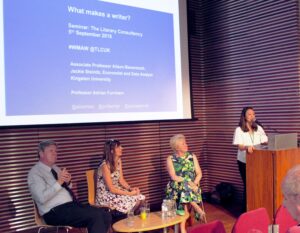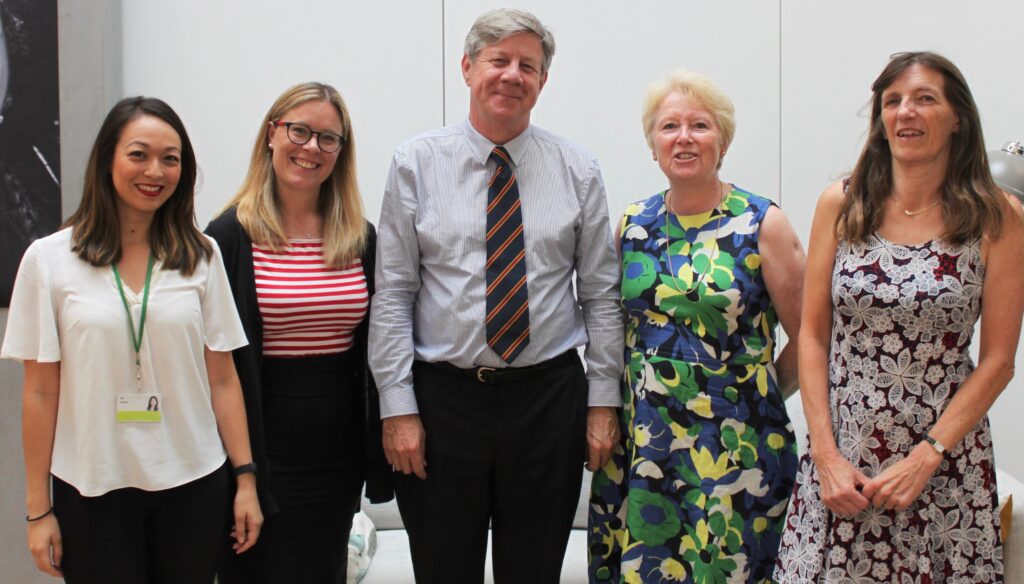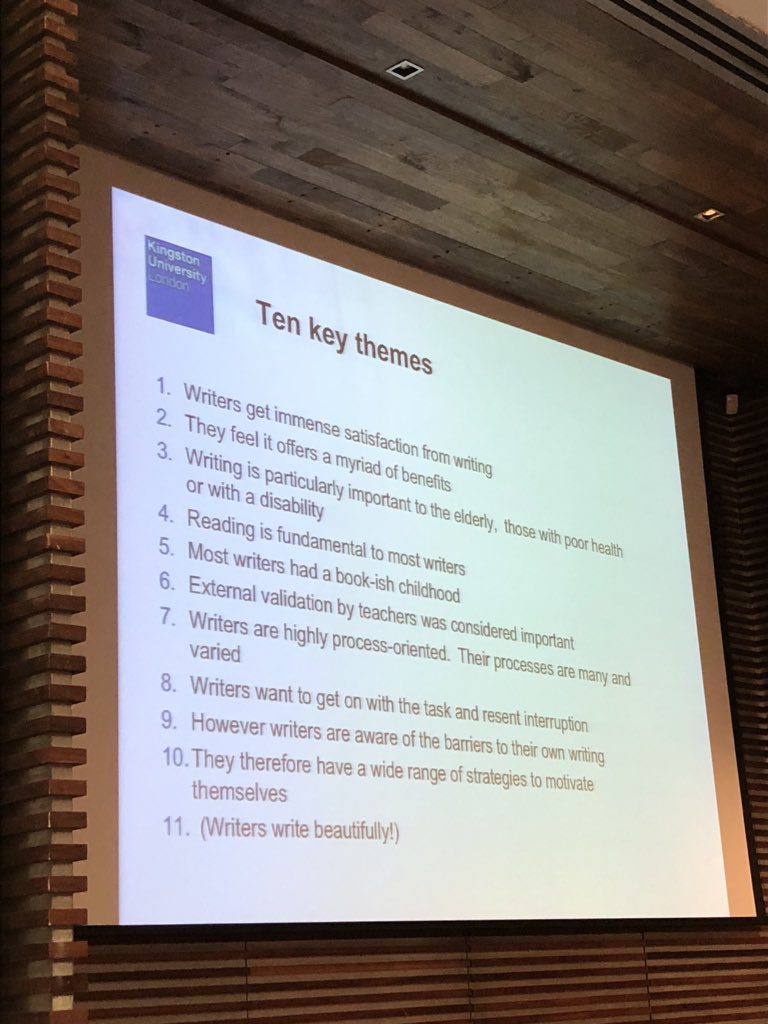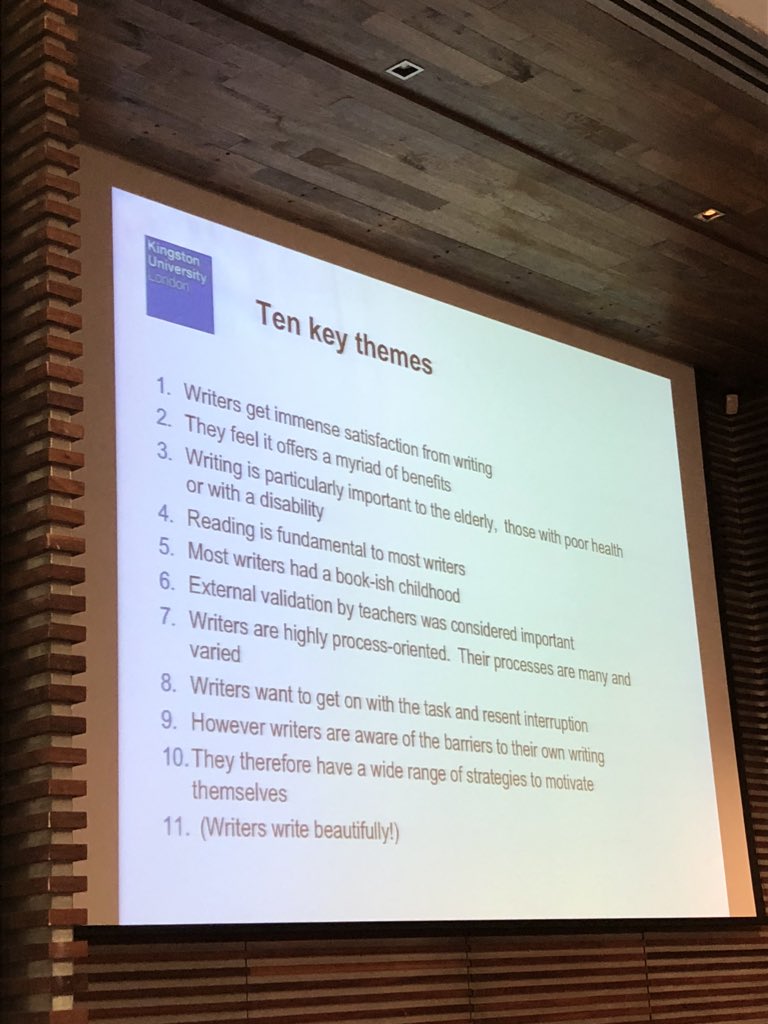
Aki Schilz of TLC introduces last week's event about What Makes a Writer (Photo: Mina Jecmenica)
“What makes a writer?” If that question sounds familiar, it may be because you are one of the many authors around the world polled for this important and substantial piece of research led by Alison Baverstock, Associate Professor of the Department of Journalism and Publishing at Kingston University London.
Whether or not you responded to her survey, as a writer you will find fascinating the results of her study. In an event hosted byT he Literary Consultancy, she presented a summary of its findings last Wednesday in London in collaboration with Jackie Steinitz, Economist and Data Analyst, and Adrian Furnham, Professor in Psychology at University College London. The audience included five ALLi author members who had kindly agreed to share their response on the blog here today.
Professor Baverstock's Overview

The presentation team – Alison is second from right (Photo: Mina Jecmenica)
First, here is Alison Baverstock's summary of the night:
“After five years of planning and detailed organisation, for me it was a moving experience to see the audience at TLC on Wednesday night.
“I have always wanted the first sharing of the information to be to those who so generously gave us the material to work on, and this was fully achieved. Each of the contributing organisations [which includes ALLi] will get a report on their membership/audience, in the context of the wider research cohort.
“The work builds on the research done with Jackie Steinitz into the practice and processes of self-publishing, and tells us a lot about how those who became writers were shaped and now work.
“This time however we involved a psychologist with a particular interest in creativity, and it was really interesting to work with him. I really enjoy working in a cross-disciplinary fashion as it stretches your understanding and brings new insights and structures.”
“And best of all, the audience were nodding throughout; they clearly recognised themselves.”
ALLi Authors' Highlights from the Presentation

ALLi author members clearly enjoyed the presentation! Photo by Lorna Fergusson (front) with Roz Morris, Karen Inglis, and Dan Holloway
Here's what ALLi authors took away from the evening:
“This is a fascinating study and one that will be a baseline for years' more work as we seek to figure out how to make the writing landscape more inclusive. One of the standouts for me was that writing in adulthood is more highly correlated to reading in childhood than writing in childhood. There are years of work to be done unpacking that one finding alone.” – Dan Holloway, ALLi News Editor, novelist, poet, and much more
“A strong message was the portrait of writing as a lifelong habit. It's not something that's learned quickly; it seems a natural step for personalities that are sensitive, curious and questioning. They might have a need to create permanence. They often started writing in school, kept it private for many years until a moment when they ‘came out‘ by going to a class or joining a group, or sending a manuscript to a publisher. Whether they used writing to earn their livings or not, it was a challenge – as much a personal process as a job. The rewards were intrinsic as much as external – a way to set their thoughts straight, put experience to use, seek healing, give an idea permanence. All in all, writing was far more a vocation than a hobby.” – Roz Morris, author of the Nail Your Novel writing guidebook series, novels, and travel memoir, and ghostwriter
“I enjoyed everything I heard and found many of my writing processes echoed in the findings.” – Deborah Bluestein, author of Botticelli's Muse

“Another thing that stood out for me was how important writing is for people who are not in good health – providing an outlet/release/defiance – as outlined in the above slide from the event. Also the professor pointed to the need to be able to cope well with rejection if you're writer… 82% of respondents had had writing rejected! (I'm surprised that wasn't higher!) He said that to be a writer you need all of the following: talent, determination, ego strength, grit, and imagination. I think that mix is very true ” – Karen Inglis, ALLi Children's Author Advisor and author of children's books:
“Things I took away from the presentation: that people are helped by having had encouraging teachers; that reading in childhood is crucial; that the level of education of those surveyed was very high; that writers own and read books far in excess of the national averages – hardly surprisingly; that writing is good for your health – one commentator called it ‘my saving grace”; that neuroticism isn't seen as a good thing but does give you ‘vigilance' – and personally I feel good writers need to have a kind of hypersensitivity to life and emotion that makes them notice things others wouldn't; that we have our writing ‘fetishes' which help us to be creative.” – Lorna Fergusson, fiction author and writing coach
“The more lighthearted thing that struck me was the 1% of people who use a typewriter – not that so few do, but that there are still any. Makes me think of the credits for Murder, She Wrote, and all those jokes based on knocking things over with the return carriage – a whole host of common references that date us!” – Dan Holloway
An ALLi Perspective on What Makes a Writer Write
“One very positive message is how similar our experiences are as writers and how that drive to be a writer so often originates in childhood. That sense of not being alone with needs, ambitions, dealing with rejections and learning what satisfies us when coming to publication – all of this is so important when we come together in a community of writers. And all of this, of course, is what ALLi does best!” – Lorna Fergusson
Many thanks to Alison Baverstock and her team, and to the ALLi authors in attendance for reporting back. We look forward to sharing more about the report in different forms over the coming months.
For more information about the background behind the research, visit our previous post here:
OVER TO YOU What makes YOU a writer? Whether or not you responded to Alison's initial survey, feel free to add your thoughts in the comments box!
Opinions: What Makes a Writer? – Feedback on Important New Research Share on XOTHER POSTS ABOUT WHAT MAKES WRITERS WRITE
From the ALLi Author Advice Center Archive




